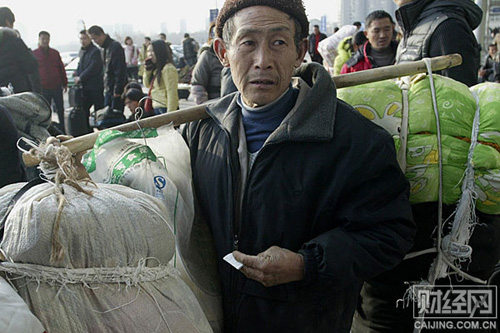|

|
|
A migrant worker at a railway station in Nanjing, Jiangsu Province, ready to take the train back to his hometown, December 30, 2008. |
The impact of the global financial crisis on export-oriented enterprises has been intensifying, and more and more migrant workers are losing their jobs due to this negative impact.
The southern area of Jiangsu Province is one of the major destinations where large number of migrant workers flow in. Job seekers in this area have been going through a tough time as a result of the global financial crisis, according to a joint investigation by the National Bureau of Statistics and Jiangsu Provincial Labor and Social Security Department.
The situation will be tougher for migrant workers in the first half of 2009, said an official from the Provincial Labor and Social Security Department.
Number of job opportunities has plummeted
Many businesses in southern Jiangsu have seen their order books slowing, and job opportunities have declined. 167,000 vacancies were available in October 2008 in five big cities of the province, 11 percent down from September.
Additionally, more and more companies have closed. Some 1,000 companies in the 12 polled counties of Jiangsu have folded, and 34,100 workers have been laid off, presenting 0.8 percent of the total companies and 1.2 percent of the total workforce respectively, according to a sample survey conducted in November 2008.
Other businesses are not operating at their full capacity. 39 percent of companies in Changzhou City do not have enough orders. 13,600 companies in the 12 polled counties are not operating at their full capacity, accounting for 10 percent of the total.
Industries such as real estate, nonferrous metal and oil are also affected by the financial crisis, and large companies have been hit by the depression as well.
According to a sample survey at least 40 chemical companies in Binhai County and 50 percent of steel strip companies in Huashi Town of Jiangyin City have halted production.
Migrant workers hit by the crisis
About 61 percent of employees of the 25 polled companies in southern Jiangsu are not local residents. More than 90 percent of employees in three closed-down companies in Qiandeng Town of Kunshan City are migrant workers.
In fact, local governments have made ensuring the employment of local residents their first priority, which could lead to tough times for more migrant workers.
Up to the beginning of 2008, there were more than 9 million migrant workers in Jiangsu, with more than 4 million coming from other provinces, according to Jiangsu Provincial Labor and Social Security Department.
330,000 rural employees have gone back to agricultural work up to the end of November 2008 in Jiangsu, 260,000 of whom are migrant workers.
Job opportunities in Kunshan City have increased at a slower pace in 2008, with the smallest growth in the fourth quarter, Director of Kunshan Labor and Social Security Bureau Shen Yiping told Caijing Magazine.
An increase in job opportunities depends on the growth and development of businesses. The Kunshan government has therefore taken a series of measures to reduce the burden on employers, such as reducing payment of unemployment insurance funds and deferring the increase of payment of social security funds, said Shen.
(China.org.cn by Yang Xi, January 6, 2009)